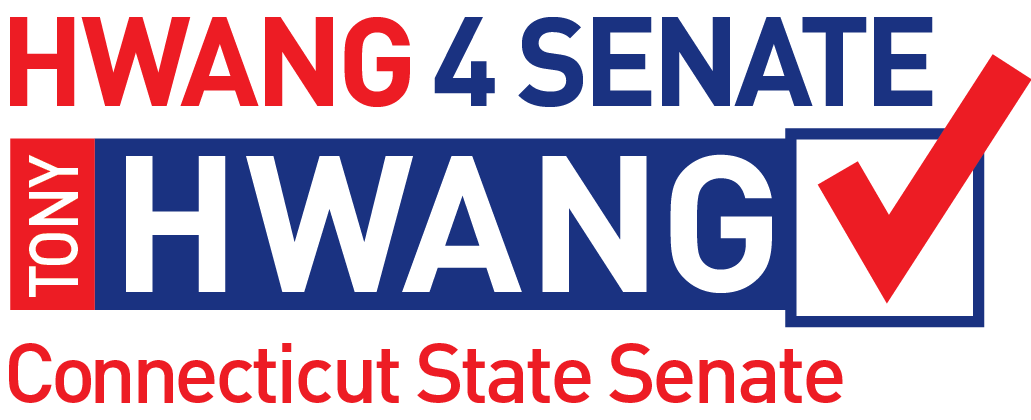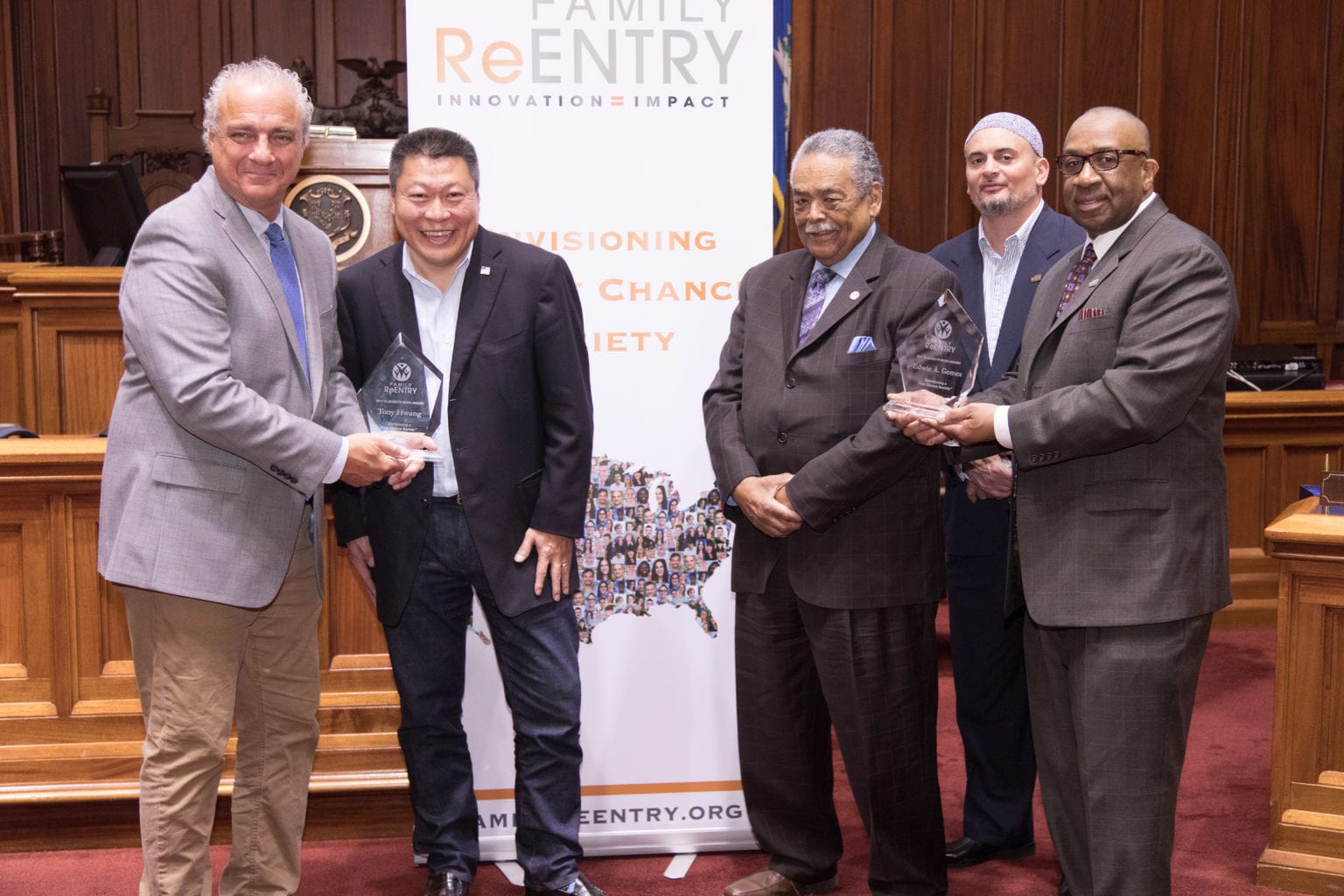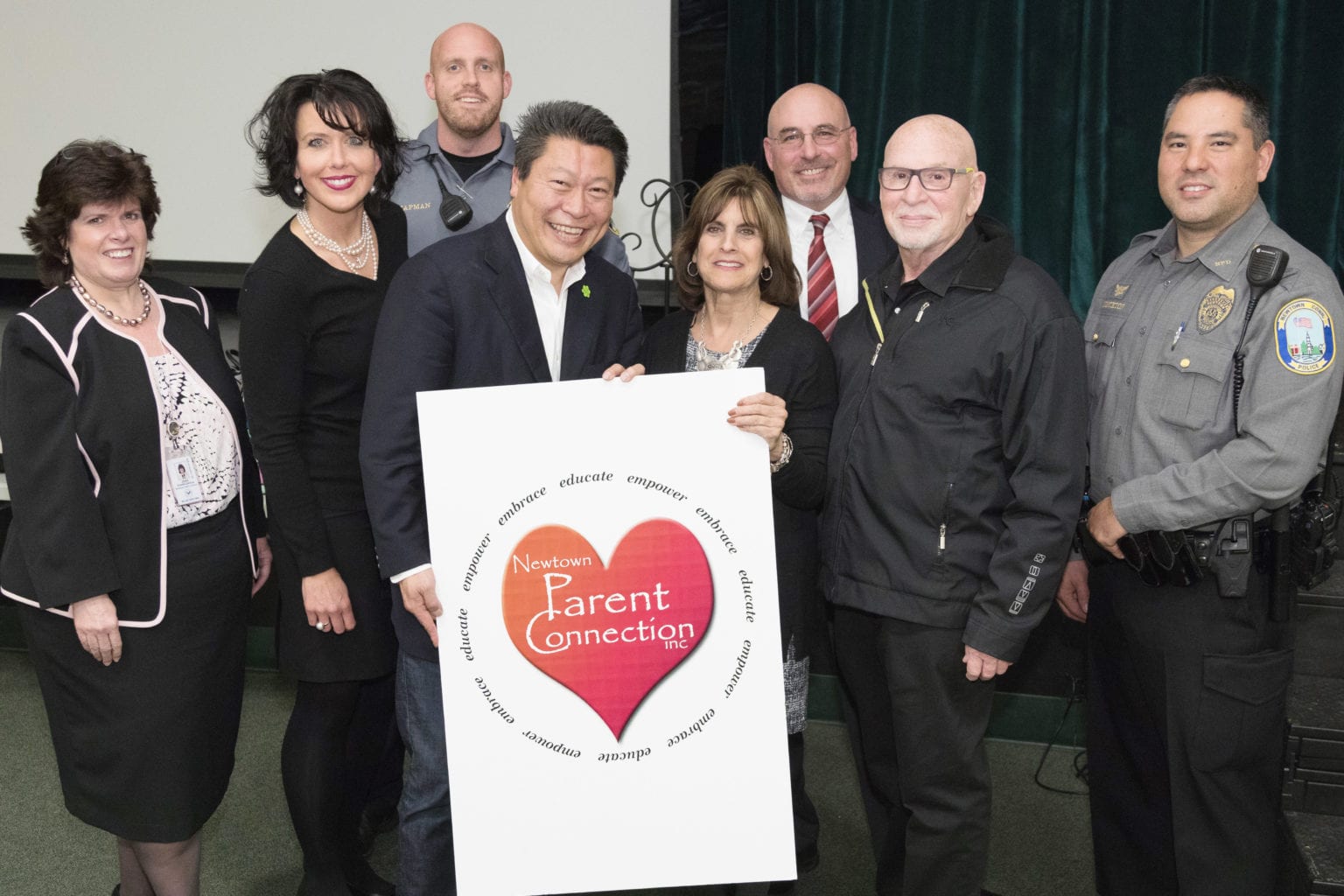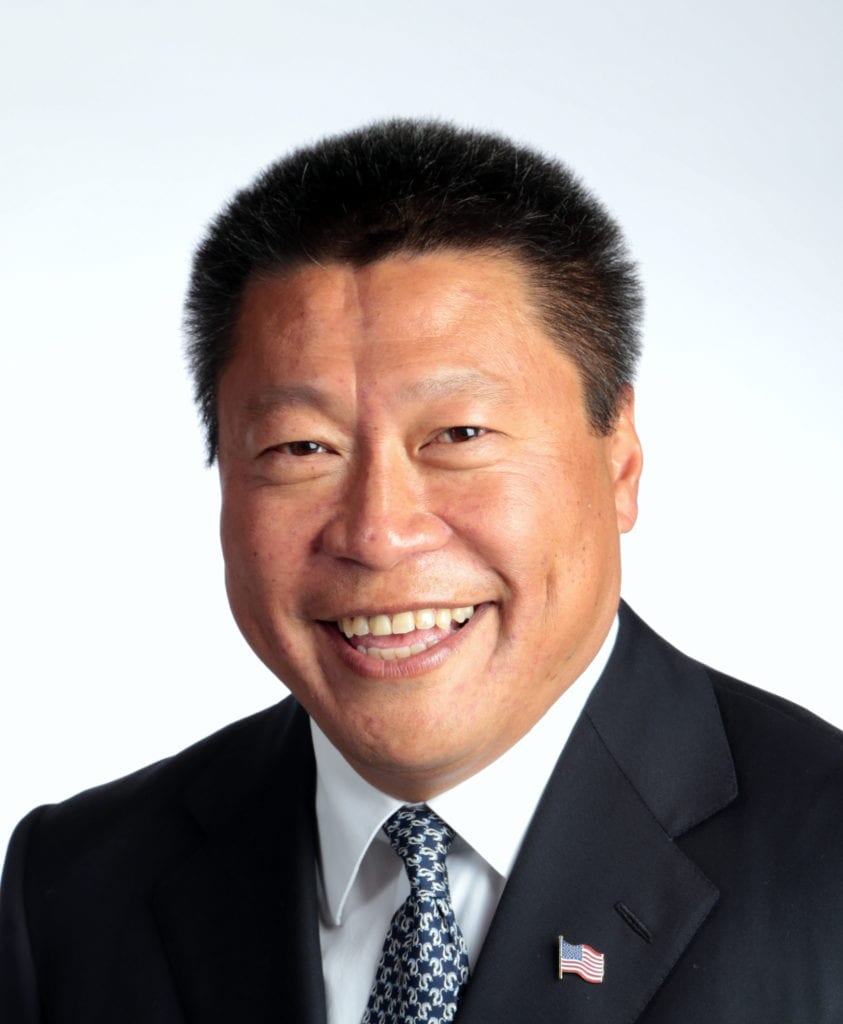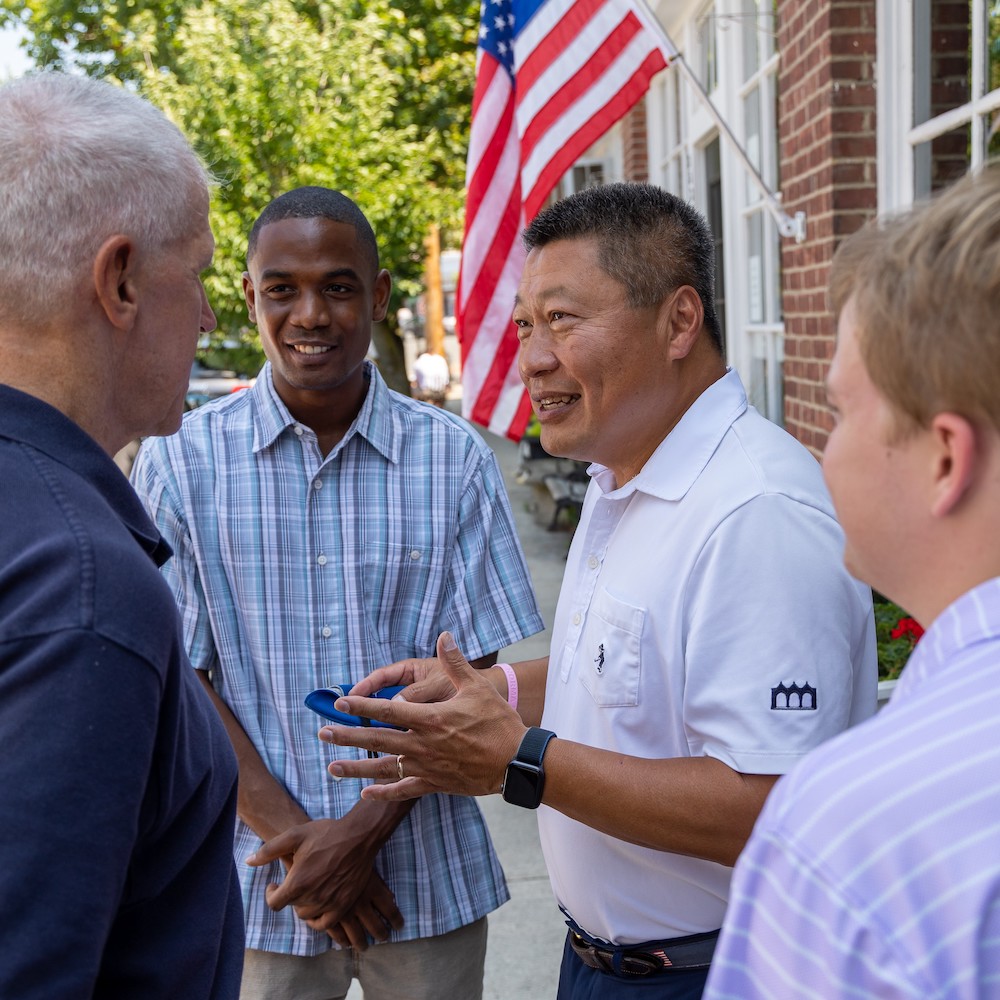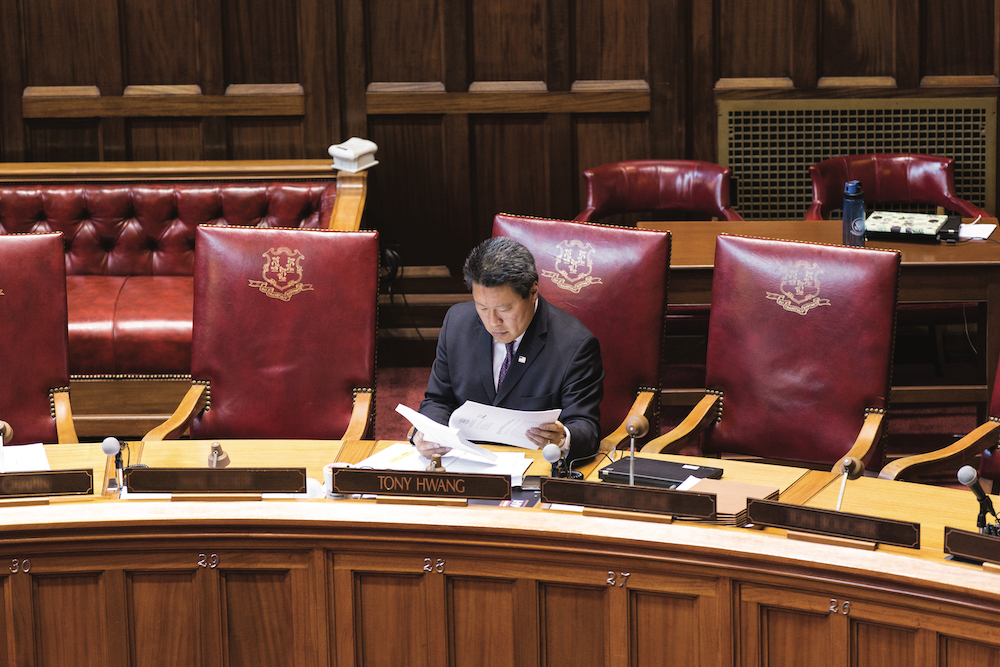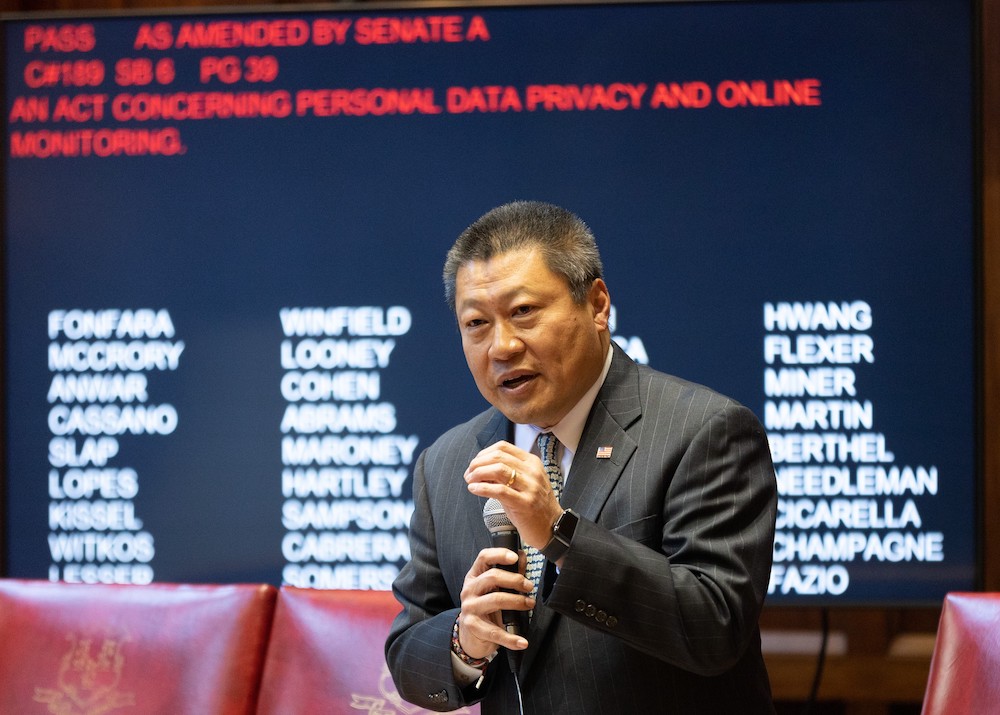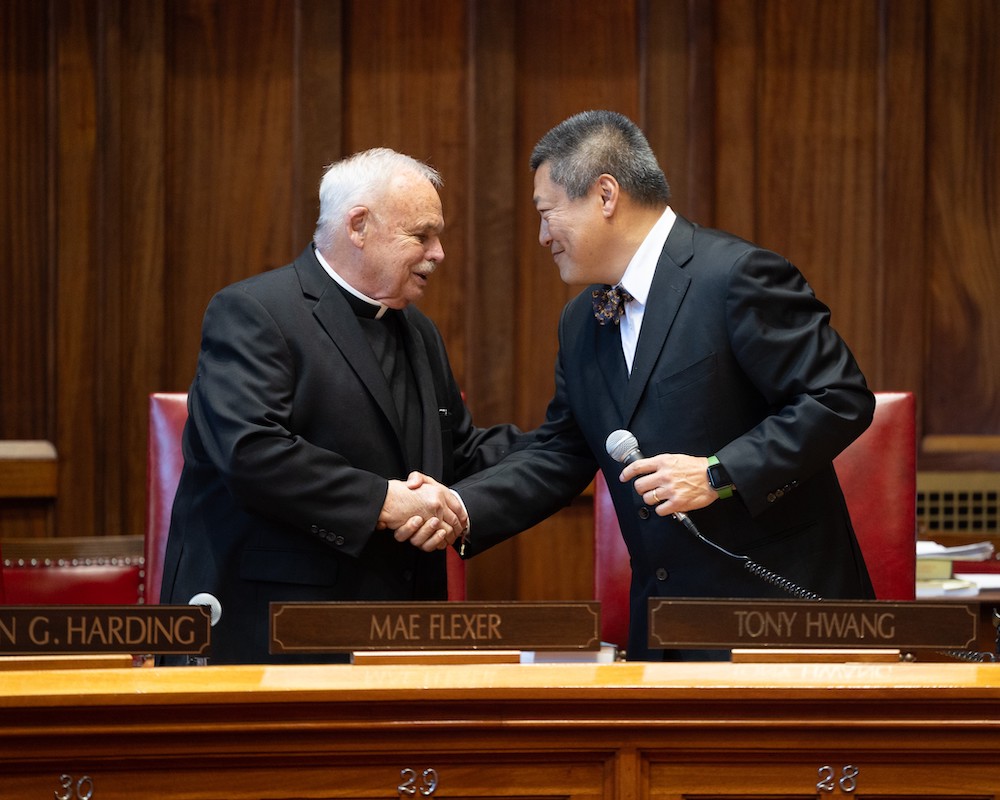Sen. Hwang: “The frustration is a lack of transparency of how government is run.”
Fairfield University’s Masters of Public Administration Program launched Tuesday in its inaugural event, an annual conference focusing on the issues and challenges of public administration in a global marketplace. This leading summit, “Moving Forward in the Absence of GE,” held at the Quick Center for the Arts, considered both the political and economic impact of General Electric’s departure from Fairfield.
“The MPA summit offers an opportunity for collaboration across governments and between businesses, community leaders and the public,” said Professor Mark LeClair. “With GE’s leaving, there is a lot of uncertainty. The summit creates a space for politicians and the business community to discuss ways to move forward and provides citizens a place to ask questions.”
The evening was moderated by News 12’s Tom Applebee and featured a panel of nine state and local elected officials, business leaders and economists, including State Senator Tony Hwang, Fairfield First Selectman Michael Tetreau, Trumbull First Selectman Timothy Herbst, the City of Bridgeport’s CFO Ken Flatto, State Representatives Brenda Kupchick, Laura Devlin and Cristin McCarthy-Vahey; Joseph McGee, VP of Public Policy and Programs for the Business Council of Fairfield County, and LeClair, a professor of economics.
“A lot of the people in this audience are worried, they came here tonight because they’re worried, Applebee said. What about my house, what about my business? What would you say to them to give them hope?”
“How does GE’s leaving impact the value of people’s homes and/or business?” Applebee asked. “I’d answer the question,” said Herbst, who was called on first, “by saying whenever you lose a business like GE, or now there’s talk about AETNA leaving the State of Connecticut, whenever you have a corporation pull out like that it creates what I call multiplier effects so when you have those jobs leaving the area it affects other businesses, the restaurant owner, the landscaper, the dry cleaner, those people whose livelihoods depend upon those jobs being in our economy and putting discretionary income into our economy.
“It doesn’t just affect people that might work for that business. With respect to property values we have costs that area among the highest in the country, we have utility costs that are among the highest in the continental United States, we have a property tax system that puts an onerous burden on towns and cities and local leaders trying to balance their budget, less state aid coming in and you’re forced to then go to your property taxes as a source.
“That affects property values, transportation affects property values. The State of Connecticut needs, to prevent further losses along these lines, to be facilitators for businesses to eliminate red tape, to reduce regulation where appropriate, and create a regulatory environment that is not punitive toward businesses. We also need to create a tax environment in our state understands the cost of living is too high.”
Flatto said, “At its peak during the 40’s, 50’s and 60’s, GE employed 20,000 manufacturing workers. When GE moved its corporate headquarters to Fairfield in the 70’s it was a wonderful thing, now not only has the manufacturing component gone and Bridgeport left with a huge blighted site (which Bridgeport is now cleaning up) but Fairfield has an enormous corporate hole in its soul. When major corporations play communities against each other it diminishes our country. There has to be a recognition that communities matter just as much as jobs matter, they go together. Corporations have to invest in their communities if they want the work force to be what they really need them to be. We are doing a redevelopment of almost a million square feet right now over the next four years in Bridgeport but it is very difficult. We need to sustain the tax base; we want to reduce everybody’s taxes.”
Tetreau said, “It’s important to look at the facts in this matter. An old Professor of mine once said, ‘you’re entitled to your own opinion but you’re not entitled to your own set of facts.’ With respect to real estate what GE did was to take an 800-person corporate headquarters and move 200 people to Boston. The other 600 people went to jobs in places like Norwalk so the hit on the real estate market wasn’t as bad from that standpoint.
“The timing couldn’t be worse, it’s a hit on prestige, on the psyche of Connecticut and the real estate market trends are really bad – the Mcmansions – the houses on bigger estates are under attack. The millennials aren’t buying those high-end homes throughout Fairfield County. In addition, in looking at what GE meant to Fairfield, the local economy wasn’t bad but Sacred Heart buying it took over a million dollars out of our tax base and the state cut us by 15 million additional dollars. In the long run I think Sacred Heart will be very positive in terms of what they do for our local economy and community. We are a town with two great Universities – I think that’s a big selling point for the Town of Fairfield.”
State Sen. Hwang said, “I think the state needs to get its financial house in order. In our conversation with the GE executives the lack of predictability, the lack of the courage to attack the challenges of the pensions and paid equity and parity issues are really what drove them out. We have to, with state government, create an ecosystem of predictability so that when our budgets are laid out and are presented to our towns, our towns then dictate their budgets appropriately. Then we have to create a system that’s sustainable for businesses to succeed. Not just simply propped up with tax dollars and incentive but a truly organic sustainability of growth and exponential enthusiasm.
“Thirdly, I think the frustration is a lack of transparency of how government is run. Whether it’s retail, real estate or corporations we have to create and move forward a momentum to help our businesses. We have to capitalize on our great educational institutions, we have to focus on our leadership in biotechnology, we have to create jobs, and then advance manufacturing but also more importantly help our small businesses. We have a loss of confidence in this state and it shows and it’s about time we move and work together to find solutions.”
McCarthy-Vahey said she moved to Fairfield to a beautiful tree-lined street. “Over the years some of the trees have been cut down as they moved through their natural life (some due to disease, some impacted by storms). As a state we are in a place, we need to replant, we need to replant trees that will thrive here in Connecticut and will grow our strengths. We need to look at some of those areas that are our strengths, which include how we partner with our universities, our technical schools, make sure we have teachers trained to be able to train students in engineering and advanced manufacturing, where we have jobs, making sure we have a viable transportation system, we need to create walkable, bikeable communities where people can get to jobs, we need to have jobs for people of all ages. We do that by better partnering with our universities, with our businesses and with government working together to come up with solutions.”
Devlin said, “If you put faulty information in, you’re going to get faulty information out. It’s not going to help you to plan a household budget guessing that you’re going to have $150,000 if the reality is you have $75,000. Going back to the fundamentals, we’ve got to be real. You’re going to have a deficit. Year after year we have seen the same thing, a lack of acknowledgement that revenues are falling because people choose to leave. Wealth is leaving the state as well having an impact – a negative cycle for our state. We have to get real about budgeting and managing the finances of our state.
“We currently face the cost of our employees and the cost of debt. In terms of businesses, we need to look at corporations as a positive thing, not a negative thing. GE’s loss was a huge hit to the psyche, think about the contributions they gave to the United Way, the executives that donated their time, and the other things they did to be good corporate partners. Government does not make those jobs; we need the job creators to support businesses and to have policies. We need to be more friendly and fair to corporations.”
Lifelong Fairfield resident Kupchick said, “GE was special to the community, they did a lot of charitable work for the community. We have a broader problem – I don’t think state government has been completely honest. When you’re saying you’re getting an 8 percent return on your investments in the state when no one else in the US was getting 8 percent – you can’t sustain that type of thing. When we met with the executives of GE when they first signaled they may be leaving, they said that there were reasons why they were looking at other places. They said the predictability factor was of concern. They said every year the State of Connecticut was not managing its budget properly and that every single year they were coming up short and they knew who they’d be coming after to pick up that slack.
“Businesses are concerned that every year when a state government can’t manage its fiscal house that they are going to get hit with some additional tax. GE said to us that day, when the State of Connecticut hit them with that regressive tax and said we are going to tax you back all the way to January when they hit for the $1.8M tax, not just going forward but going all the way backward, the GE executives said they had to go to every one of their employees, many who make $50,000 or less, and not give them a pay check the month before Christmas because the State of Connecticut imposed that tax retroactively. You can’t do those things and expect companies to come to Connecticut. We need to change the way we do business here.”
LeClair spoke of GE being a major contributor both in labor and in donations to local nonprofits before discussing the challenges Connecticut is facing in three categories, “the housing market, retail, and the Fairfield tax base.
“Connecticut used to have the highest per income capita in the country, we’re now number four, we are the third highest in the US in wealth and we also used to be the top there, yet we’re hostile to people who own wealth,” he said. “We tax Social Security, we are one of only 13 states that do so. The state used to talk about the three-legged stool that kept the state going: defense, colleges/universities and the insurance industry. On the positive side we didn’t lose a manufacturing facility (Sikorsky). The housing market in Connecticut is benefitting from affordability in New York, the average price from a sale in Manhattan now is $2.1M – that pushes homebuyers to Connecticut.”
McGee said, “GE migrated to the suburbs 45 years ago to solid safe communities, good schools, recreation and a better quality of life. The problem is after 45 years in a garden community how many times can you see the ducks have ducklings? With this move back to the city of Boston they have a whole new culture. GE is moving from city to suburb to city. They did not go back to New York, though New York is the most innovative most dynamic economy in the world right now.
Connecticut has to fix its pension funds, they are squeezing out other investors, it’s extremely profligate and you cannot vote to either Democrat or Republican legislature that does not solve that problem. It is a prerequisite to economic growth. A bigger thing is going on – a digital revolution. This is as big as the industrial revolution in the 19th century; we are changing the way we are working. It’s changing the force work we need, where they live and the talent that’s changing from medicine to industry across the board.
“How do you take a bedroom community and reposition it to integrate its two colleges into an elementary and high school system that needs to adapt dramatically to the new way that we’re working. None of that happens until we address the pension fund problem.”
